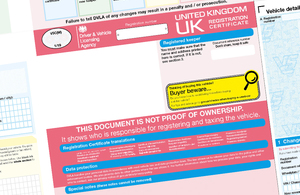New plans to unlock the power of gene editing to help our farmers grow more resistant, more nutritious and more productive crops have been published as part of the government response to the gene editing consultation, announced today (29 September) by Environment Secretary George Eustice.
The response sets out how we plan to pave the way to enable use of gene editing technologies, which can help better protect the environment.
Gene editing is a tool that makes plant breeding more precise and efficient so we can breed crops that are more nutritious, resistant to pests and disease, more productive and more beneficial to the environment, helping farmers and reducing impacts on the environment.
Research could lead to sugar beet varieties resistant to viruses that can cause serious yield losses and costs to farmers unless pesticides are used. Such new varieties would help make our farmers more productive and, importantly, also reduce the need for chemical pesticides, protecting our bees and other pollinating insects.
Gene editing is different from genetic modification, because it does not result in the introduction of DNA from other species and creates new varieties similar to those that could be produced more slowly by natural breeding processes – but currently they are regulated in the same way as genetically modified organisms.
Leaving the EU allows the UK to set our own rules, opening up opportunities to adopt a more scientific and proportionate approach to the regulation of genetic technologies. As a first step, the government will change the rules relating to gene editing to cut red tape and make research and development easier.
The focus will be on plants produced by genetic technologies, where genetic changes could have occurred naturally or could have been a result of traditional breeding methods.
Environment Secretary George Eustice said:
Gene editing has the ability to harness the genetic resources that nature has provided. It is a tool that could help us in order to tackle some of the biggest challenges that we face – around food security, climate change and biodiversity loss.
Outside the EU, we are able to foster innovation to help grow plants that are stronger and more resilient to climate change. We will be working closely with farming and environmental groups to ensure that the right rules are in place.
Defra chief scientific advisor Gideon Henderson said:
Gene editing technologies provide a more precise way of introducing targeted genetic changes – making the same types of changes to plants and animals that occur more slowly naturally or through traditional breeding.
These tools enable us to harness the richness of natural variation to build better crops, speeding up a process humans have done through breeding for hundreds of years.
There are exciting opportunities to improve the environment, and we can also produce new varieties that are healthier to eat, and more resistant to climate change.
Scientists will continue to be required to notify Defra of any research trials. The planned changes will ease burdens for research and development involving plants, using technologies such as gene editing, to align them with plants developed using traditional breeding methods.
The next step will be to review the regulatory definitions of a genetically modified organism, to exclude organisms produced by gene editing and other genetic technologies if they could have been developed by traditional breeding. GMO regulations would continue to apply where gene editing introduces DNA from other species into an organism.
The government will consider the appropriate measures needed to enable gene edited products to be brought to market safely and responsibly. In the longer term, this will be followed by a review of England’s approach to GMO regulation more broadly.
We are committed to the very highest standards of environmental and food safety in the UK. There will be no weakening of our strong food safety standards. Gene edited foods will only be permitted to be marketed if they are judged to not present a risk to health, not mislead consumers, and not have lower nutritional value than their non-genetically modified counterparts.
The government will continue to work with farming and environmental groups to develop the right rules and to ensure robust controls are in place to maintain the highest food safety and environmental protection standards, while supporting the production of healthier food.
Professor Robin May, the Food Standards Agency’s Chief Scientific Adviser, said:
There are significant benefits to changing the way we regulate genetic technologies, to make sure the system is as up to date as possible and properly takes into account new technologies and scientific discoveries.
We support giving consumers choice and recognise the potential benefits that GE plants and animals may bring to the food system.
We are working closely with Defra and a range of other partners to ensure that potential changes to the regulation of genetic technologies will maintain the high food standards that UK consumers currently enjoy.
Samantha Brooke, Chief Executive of the British Society of Plant Breeders, said:
Changing the way new agricultural breeding technologies are regulated, by taking gene editing out of the scope of GMO rules, will encourage research and innovation to develop healthier, more nutritious food, and to make farming systems more sustainable and resilient in the face of climate change.
Gene editing involves making desired changes to a plant or animal which could have occurred naturally or through conventional breeding, but more quickly and with greater precision. Developing an improved crop variety using conventional breeding – for example to improve its nutritional quality or resistance to disease – can take up to 15 years, but gene editing can help reduce that timescale significantly.
Without the contribution of plant breeding over the past 20 years, farmers would have produced 20% less food in this country, which means an extra 1.8 million hectares of land would have been needed to supply our food needs. That expansion would have impacted vulnerable ecosystems, and generated an extra 300 million tonnes of greenhouse gas emissions.
Current regulations on plant breeding and seeds support safer and more sustainable food production, and this regulatory system can also embrace new crop varieties produced using gene editing techniques, which replicate what plant breeders are already doing, but in a much quicker and more targeted way.
We strongly welcome the Government’s plan to make controls on gene editing more science-based. This sends a clear signal that the UK is set on a more pro-innovation trajectory outside the EU. It will certainly boost prospects for plant breeding companies large and small, as well as scientists in the public sector, to continue improving our food crops for the benefit of society and the environment.
Professor Helen Sang OBE, Head of Division of Functional Genetics and Development, The Roslin Institute and R(D)SVS, said:
Gene editing offers major opportunities to address the combined challenges of rapidly increasing global demand for healthy and nutritious food with the goal of net zero carbon emissions.
I welcome today’s announcement as a first step towards reducing unnecessary and unscientific regulatory barriers to the use of advanced breeding techniques which are precise and targeted, allowing us to make specific genetic changes.
Adopting a more proportionate and enabling approach to regulation will open up increased opportunities for international research collaboration, inward investment and technology-based exports, bringing a major boost for UK science.


